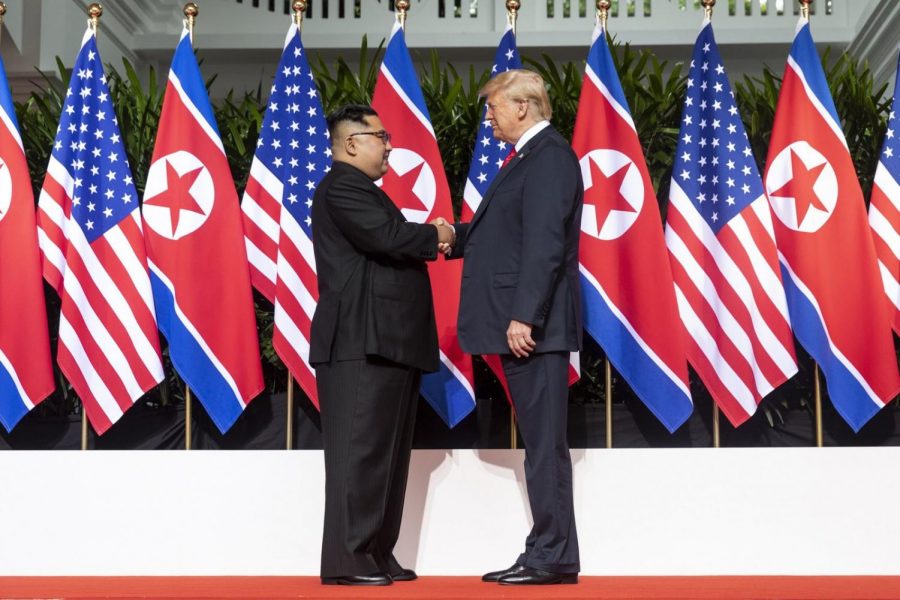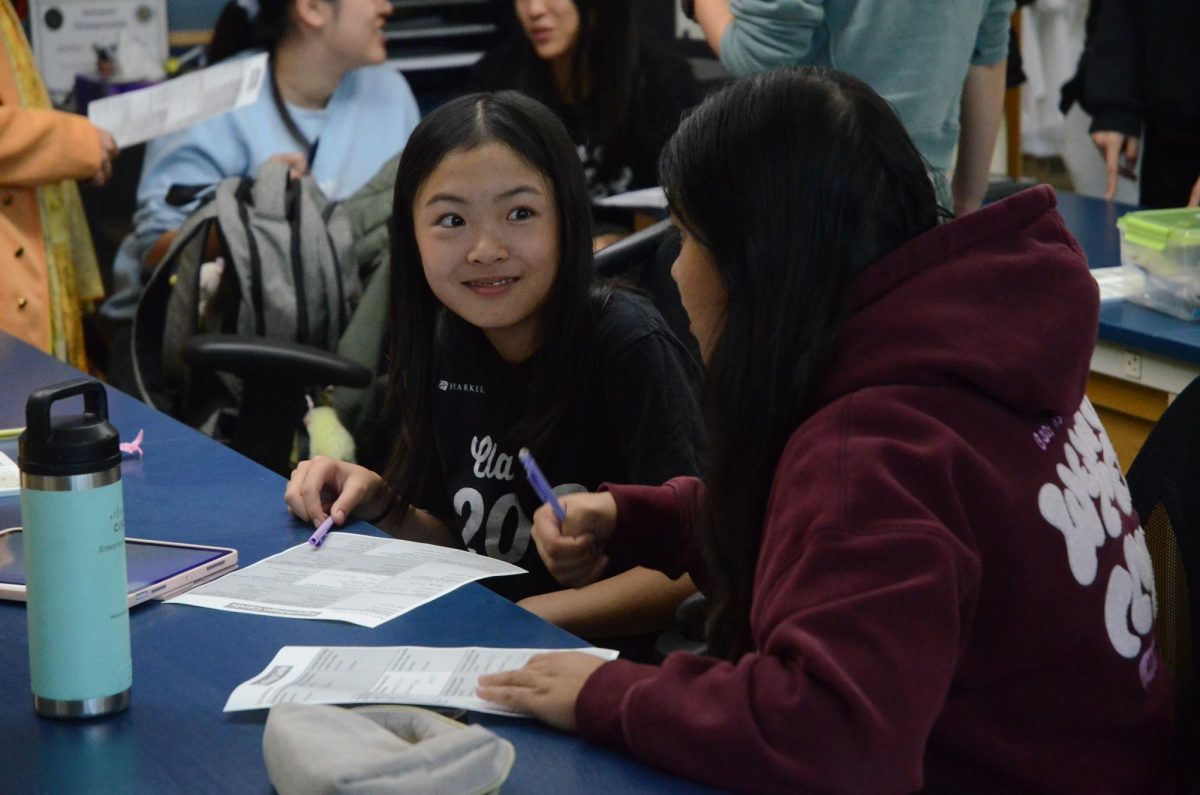Trump meets with Putin and Kim Jong Un
August 31, 2018
From allying with Russia to reinstituting an amicable relationship with North Korea, Trump’s actions have influenced U.S. international relations drastically.
Summit with North Korea
June 12, 2018, was a historic day. President Donald Trump became the first sitting U.S. president to meet face-to-face with a North Korean leader.
At the summit, President Trump and North Korean leader Kim Jong-un signed a statement committing to build the peace and prosperity of the Korean peninsula, to work towards denuclearization and to return and recover the remains of prisoners of war and missing soldiers from past military excursions.
Tensions have been rising between the U.S and North Korea since the Korean War (1950-53), and North Korea’s continued attempts to build a nuclear state and conduct long range missile tests further increase conflict. Responding to North Korea’s continued instigating behavior, Trump threatened to use “fire and fury” against North Korea in a UN speech in September 2017. Trump later took to Twitter to call Kim Jong Un the “Little Rocket man.” Kim and Trump continue exchanging words about whose nuclear button is bigger and more powerful.
Orchestrated by South Korea’s president, Moon Jae-in, the South Korean National Security Adviser, Chung Eui-Yong, announced in March 2018 that there would be a meeting between Trump and Kim. Later, Trump cancelled the meeting in a letter to Kim in May 2018. The meeting eventually took place in Singapore.
As an outcome of the meeting, Trump suspended military exercises conducted by the U.S. and South Korea in the Korean peninsula, raising concerns from some about the impact on the readiness of our troops and potentially increasing chances of North Korea becoming the dominant actor in the peninsula.
Masako Toki, project manager and research associate in the Nonproliferation Education Program at the Middlebury Institute of International Studies at Monterey, found it concerning that this decision was not consulted with the allies.
“The problem of his decision is that he didn’t consult with President of South Korea beforehand,” Toki said. “Japan and South Korea are US allies and both countries rely on US and their trust between each other amongst the allies is very important. But what Trump did was very extraordinary.”
Additionally, Toki emphasized that the situation between South Korea and Japan is quite different. “South Korea’s bigger goal and larger objective is to improve relationship with North Korea so they can swallow some of Trump’s attitude,” she said. “Japan’s situation is more difficult. North Korea is strengthening criticism against Japan. For Japan the only country that Japan can rely on is US. It is extremely important for Japan to be closely consulted by US. This decision by Trump must come as a big shock.”
So far, North Korea has returned 55 sets of remains of American soldiers on July 27 without any fee. The White House applauded the efforts and actions of North Korea as a first step towards positive change in rebuilding relationships.
Though North Korea has fulfilled a part of its commitment, it is merely in a freeze state. Having previously exited the Non-Proliferation Treaty and having reopened nuclear plants, North Korea could resume nuclear testing as long as it has the weapons and capability to do so. The steps towards Trump administration’s “complete, verifiable, irreversible denuclearization” (CVID) goal are still not defined.
Toki does not expect any significant development towards CVID to happen anytime soon. “North Korea does not want to denuclearize,” she said. “But they are buying time and trying to manipulate the Trump administration and on the surface they want to improve a diplomatic relationship with the US.”
Summit with Russia
U.S. President Donald Trump and Russian President Vladimir Putin met one-on-one for their first official meeting at a summit on July 16 in Helsinki, Finland, despite a group of top Senate Democrats urging the President to not meet Putin.
Since there was no official statement issued after the summit, it was unknown whether any agreement was reached between the two leaders. Subsequently it was revealed that there was a wide range of issues discussed at the meeting ranging from the Syrian refugee crisis, Russia’s annexation of Crimea, extension of New Strategic Arms Reduction Treaty (START) treaty and denuclearization of North Korea.
On July 13, special counsel Robert Mueller indicted 12 Russian intelligence agents charged with interfering with the 2016 U.S. presidential elections. However, at their joint press conference after the summit, to the disbelief of many, Trump found Putin’s denial of interfering with the U.S. 2016 Presidential election “extremely strong” and “powerful” despite evidence from U.S. intelligence agencies to the contrary. Additionally, Trump remarked that Russia was a “good competitor” and blamed America’s “foolish” actions for the deterioration of relations between the U.S. and Russia.
Trump’s responses were met with outrage from Democrats and some Republicans.
Former CIA Director John Brennan tweeted Trump’s behavior as “treasonous”, Senate Democratic leader Chuck Schumer stated that Trump’s actions were “thoughtless, dangerous, and weak”, and Republican Senator John McCain called Trump’s remarks “disgraceful.”
Putin also offered to cooperate with Mueller’s investigation of Russians suspected of interfering in the U.S. 2016 election in exchange for the opportunity to question some Americans whom Putin’s administration suspects of breaking the law in Russia.
Stating that it would be more beneficial to meet after the investigation into Russia and the 2016 election was over, the White House announced on July 25 that Trump would postpone Putin’s visit to the U.S., previously planned for the fall of 2018, till the beginning of next year.
This piece was originally published in the pages of The Winged Post on Aug. 31, 2018.


















![“[Building nerf blasters] became this outlet of creativity for me that hasn't been matched by anything else. The process [of] making a build complete to your desire is such a painstakingly difficult process, but I've had to learn from [the skills needed from] soldering to proper painting. There's so many different options for everything, if you think about it, it exists. The best part is [that] if it doesn't exist, you can build it yourself," Ishaan Parate said.](https://harkeraquila.com/wp-content/uploads/2022/08/DSC_8149-900x604.jpg)




![“When I came into high school, I was ready to be a follower. But DECA was a game changer for me. It helped me overcome my fear of public speaking, and it's played such a major role in who I've become today. To be able to successfully lead a chapter of 150 students, an officer team and be one of the upperclassmen I once really admired is something I'm [really] proud of,” Anvitha Tummala ('21) said.](https://harkeraquila.com/wp-content/uploads/2021/07/Screen-Shot-2021-07-25-at-9.50.05-AM-900x594.png)







![“I think getting up in the morning and having a sense of purpose [is exciting]. I think without a certain amount of drive, life is kind of obsolete and mundane, and I think having that every single day is what makes each day unique and kind of makes life exciting,” Neymika Jain (12) said.](https://harkeraquila.com/wp-content/uploads/2017/06/Screen-Shot-2017-06-03-at-4.54.16-PM.png)








![“My slogan is ‘slow feet, don’t eat, and I’m hungry.’ You need to run fast to get where you are–you aren't going to get those championships if you aren't fast,” Angel Cervantes (12) said. “I want to do well in school on my tests and in track and win championships for my team. I live by that, [and] I can do that anywhere: in the classroom or on the field.”](https://harkeraquila.com/wp-content/uploads/2018/06/DSC5146-900x601.jpg)
![“[Volleyball has] taught me how to fall correctly, and another thing it taught is that you don’t have to be the best at something to be good at it. If you just hit the ball in a smart way, then it still scores points and you’re good at it. You could be a background player and still make a much bigger impact on the team than you would think,” Anya Gert (’20) said.](https://harkeraquila.com/wp-content/uploads/2020/06/AnnaGert_JinTuan_HoHPhotoEdited-600x900.jpeg)

![“I'm not nearly there yet, but [my confidence has] definitely been getting better since I was pretty shy and timid coming into Harker my freshman year. I know that there's a lot of people that are really confident in what they do, and I really admire them. Everyone's so driven and that has really pushed me to kind of try to find my own place in high school and be more confident,” Alyssa Huang (’20) said.](https://harkeraquila.com/wp-content/uploads/2020/06/AlyssaHuang_EmilyChen_HoHPhoto-900x749.jpeg)









